HR Minute Brought to You By: Bryan Peterson, VP Human Resource Services
Staff not getting along can be very frustrating for supervisors. Many times our employees forget the basic notion that we do not need to be best friends with those we work with. The expectation that everyone should be working with is that our job is to be courteous, respectful and professional with those around us. We are not always going to like someone we work with, but we still need to be able to come to work and get a job done despite our feelings towards others.
Many interpersonal “fires” start as a small, simple difference in opinion. The parties do not engage in open dialogue as to what was bothering them, and the small situation continues to grow into a bigger “fire.” Supervisors need to be proactive with conflict situations and deal with them sooner than later. What can we do to deal with conflict sooner and get that sense of relief when it is over, versus always having that pit in our stomach knowing something needs to be done but not knowing what to do about it?
At some point, we are probably going to have to get the employees together to discuss the situation and how both parties can move positively forward. This process may start with one-on-one meetings to determine the root causes of what is causing the conflict and then finish with a group meeting to discuss solutions. Facilitating the group meeting can be confusing and concerning to the supervisor. The facilitator’s role is to truly keep the meeting focused and on track. These simple ground rules being set with both parties can help the facilitator run a productive meeting.
- We agree to take turns speaking and to not interrupt each other.
- We agree to call each other by our first names, not “he” or “she.”
- We agree not to blame, attack, or engage in put-downs and will ask questions of each other for the purpose of gaining clarity and understanding.
- We agree to stay away from establishing hard positions and express ourselves in terms of our personal needs and interests and the outcomes we wish to realize.
- We agree to understand the other person’s needs and interests.
- We recognize that even if we do not agree with it, each of us is entitled to our own perspective.
- We will not dwell on things that did not work in the past but instead focus on the future we would like to create.
- We agree to make a conscious, sincere effort to refrain from unproductive arguing, venting or narration, and we agree to use our time the meeting to work toward what we “perceive” to be our fairest and most constructive agreement possible.
- We will speak up if something is not working for us in the meeting.
Once the group meeting process has finished, follow up is key. The supervisor should continue to follow up with both parties to gauge whether the parties are living up to their commitments to each other as to how they will interact in the workplace. Baby steps is the goal. The hope out of the process is for incremental positive change over a sustained time period.





